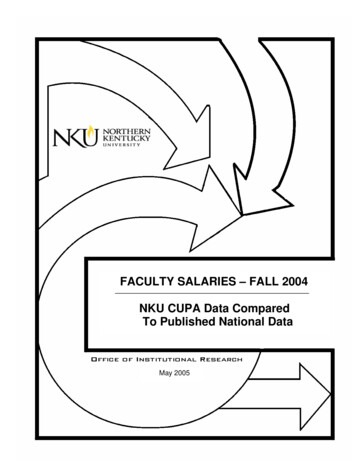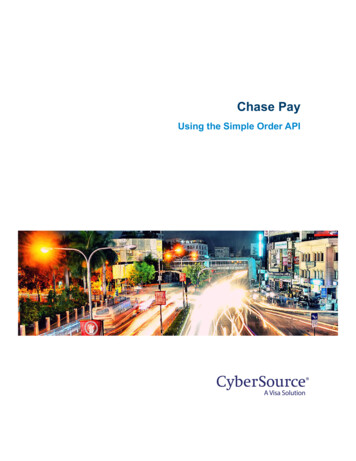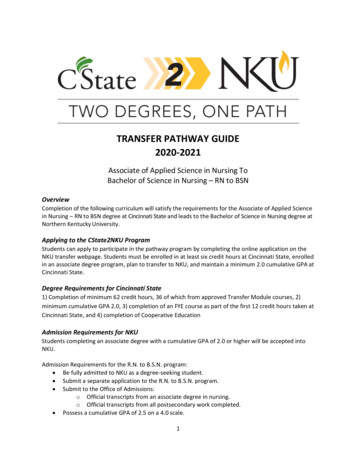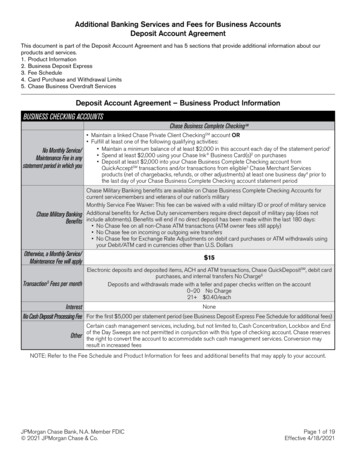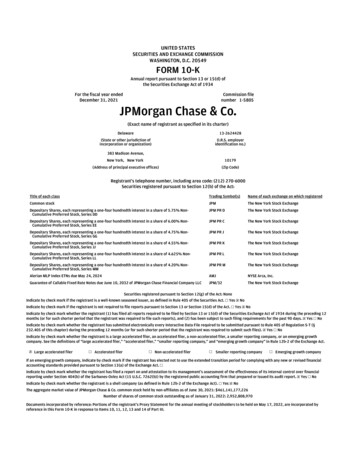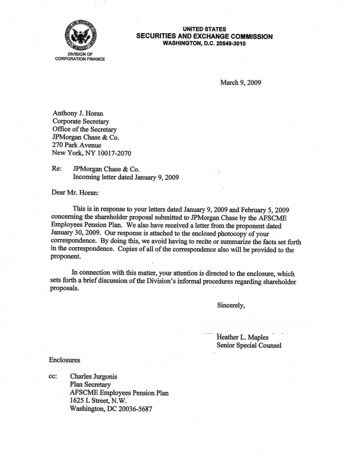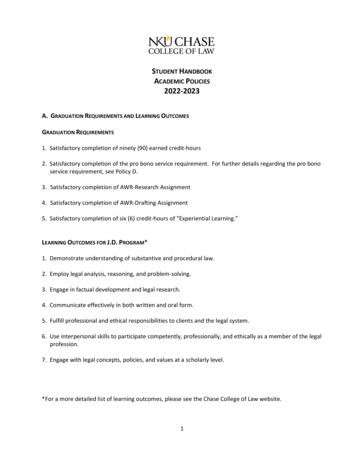
Transcription
N UCHASECOLLEGE OF LAWSTUDENT HANDBOOKACADEMIC POLICIES2022-2023A. GRADUATION REQUIREMENTS AND LEARNING OUTCOMESGRADUATION REQUIREMENTS1. Satisfactory completion of ninety (90) earned credit-hours2. Satisfactory completion of the pro bono service requirement. For further details regarding the pro bonoservice requirement, see Policy D.3. Satisfactory completion of AWR-Research Assignment4. Satisfactory completion of AWR-Drafting Assignment5. Satisfactory completion of six (6) credit-hours of ‟Experiential Learning.”LEARNING OUTCOMES FOR J.D. PROGRAM*1. Demonstrate understanding of substantive and procedural law.2. Employ legal analysis, reasoning, and problem-solving.3. Engage in factual development and legal research.4. Communicate effectively in both written and oral form.5. Fulfill professional and ethical responsibilities to clients and the legal system.6. Use interpersonal skills to participate competently, professionally, and ethically as a member of the legalprofession.7. Engage with legal concepts, policies, and values at a scholarly level.*For a more detailed list of learning outcomes, please see the Chase College of Law website.1
B. REQUIRED COURSESThe curriculum at Chase College of Law includes several required courses, which all students must complete.The required courses (for students entering in 2022) are the following:1.Basic Legal Skills (Research) (2 hours)2.Basic Legal Skills (Writing) I and II (4 hours)3.Business Organizations (4 hours)4.Civil Procedure I and II (6 hours)5.Constitutional Law I and II (6 hours)6.Contracts I and II (6 hours)7.Criminal Law (3 hours)8.Criminal Procedure (3 hours)9.Evidence (4 hours)10.Family Law (3 hours)11.Interviewing, Counseling, and Negotiating (2 hours; evening only)12.Legal Analysis and Problem Solving (0 hours, but a graduation requirement)13.Legal Methods I and II (0 hours, but a graduation requirement for day students)14.Legal Studies I and II (2 hours; evening students only)15.Professional Responsibility (3 hours)16.Property I and II (6 hours)17.Torts I and II (6 hours)18.UCC Basics (4 hours)19.Wills and Trusts (3 hours)** Students must also complete a minimum of six hours of “experiential learning” (clinics, fieldplacements, simulation classes).2
C. ELECTIVE COURSES AND THE CALCULATION OF CREDIT HOURSELECTIVE COURSESAll courses that are not required courses are elective courses. Almost all elective courses are graded on anA/F scale. Pass/Fail courses will be identified on each semester’s ‟course notes” that accompany theregistration materials.CALCULATION OF CREDIT HOURS1The American Bar Association standards for accrediting law schools contain a formula for calculating theamount of work that constitutes one credit hour. According to ABA Standard 310(b)(1), “a ‘credit hour’ is anamount of work that reasonably approximates: (1) not less than one hour of classroom or direct facultyinstruction and two hours of out-of-class student work per week for fifteen weeks, or the equivalent amountof work over a different amount of time.” As a result, you should be spending the following amount of timeper week, at a minimum, for your courses:1-hour courses should require at least three hours (2 outside of class and 1 in class)2-hour courses should require at least six hours (4 outside of class and 2 in class)3-hour courses should require at least nine hours (6 outside of class and 3 in class)4-hour courses should require at least twelve hours (8 outside of class and 4 in class)* For purposes of this Standard, fifty minutes suffice for one hour of classroom or direct faculty instruction.An “hour” for out-of-class student work is sixty minutes. The fifteen-week period may include one week fora final examination.1The faculty-approved policy regarding ABA Standard 310 is attached as Appendix A.3
D. PRO BONO SERVICE REQUIREMENT, ADVANCED WRITING REQUIREMENTS, AND EXPERIENTIAL LEARNINGIn addition to completing the course requirements for graduation, students must complete all other ChaseCollege of Law academic requirements, including the pro bono service requirement, the two AdvancedWriting Requirements, and the “experiential learning” requirement.Pro Bono Service Requirement for Students Who Enrolled at the College of Law Starting in May 2021 andThereafterAs a prerequisite for graduation, all students must complete 30 hours of pro bono service prior to his/heranticipated graduation date. Students will not be certified for graduation until the pro bono requirement iscompleted. Pro bono service performed by the student must be uncompensated and must be performed atan approved placement site. Pro bono service is service for which a student may not receive academic credit.The 30 hours of pro bono service must be law-related service. For this purpose, law-related service is service:1. In public interest or pro bono organizations, or other non-profit organizations;2. In the public sector (governments, legislatures, and courts); or3. With private practitioners or law firms where the work is performed at no cost or at a reduced feeon behalf of underrepresented clients (e.g., volunteer lawyer cases).Further details of this graduation requirement are provided in the Pro Bono Service Program Handbook.Pro Bono Service Requirement for Students Who Enrolled at the College of Law prior to May 2021As a prerequisite for graduation, all students must complete 50 hours of pro bono service prior to his/heranticipated graduation date. Students will not be certified for graduation until the pro bono requirement iscompleted. Pro bono service performed by the student must be uncompensated and must be performed atan approved placement site. Pro bono service is service for which a student may not receive academic credit.The 50 hours of pro bono service may be provided in a broad range of law-related settings, includingcharitable, religious, civic, community, governmental, and educational organizations in matters that aredesigned to address the needs of persons of limited means. All pro bono and community service projectsmust be pre-approved by the Pro Bono Project Coordinator.Election to Complete the 30-Hour Requirement (Instead of 50-Hour Requirement)Students who enrolled at the College of Law prior to May 2021 may elect to be governed by the 30-hour probono service graduation requirement applicable to students who first enrolled at the law school in May 2021and thereafter. Students who make this election may use any pro bono hours previously recorded towardthe 30-hour requirement, but only if those hours meet the definition of law-related work as defined by thepro bono policy for students enrolled in the College of Law starting in May 2021 and thereafter.Further details of this graduation requirement are provided in the Pro Bono Service Program Handbook.4
DESCRIPTION OF THE ADVANCED WRITING REQUIREMENTSThe Advanced Writing Requirement is a graduation requirement that does not generate any separate credithours. The requirement consists of a research component and a drafting component and can be met asfollows:RESEARCH COMPONENTCompletion of a research paper prepared in conjunction with:A designated small-enrollment elective course or seminar (twenty student maximum) or an electiveor seminar which, in fact, has twenty or fewer students. The research paper shall be prepared underthe supervision of the full-time professor teaching that course or seminar. Enrollment in coursesdesignated as satisfying the AWR - Research requirement is not necessarily capped. A professormay cap AWR availability in a particular course, but that cap can be no fewer than 15 students.LAW REVIEWA student who writes a research paper as a member of the Northern Kentucky Law Review may receive creditfor AWR-Research under the supervision and approval of the Editor-in-Chief and then a full-time professorin consultation with a faculty advisor for the Law Review.DRAFTING COMPONENTCompletion of a substantial drafting assignment prepared as part of (A) a designated upper-level course, or(B) a designated elective or seminar with fifteen or fewer students. The drafting assignment shall beprepared under the supervision of the full-time or part-time professor. The professor must offer the AWRopportunity to no fewer than fifteen students and no more than twenty students. If the course has fewerthan fifteen students, the professor must offer AWR-Drafting credit to all students. Subject to the approvalof the Associate Dean, the professor may increase the number of students allowed to receive AWR-Draftingcredit.Students must have successfully completed Basic Legal Skills Research and Basic Legal Skills Writing beforeundertaking the Advanced Writing Requirement. The research component and drafting component must besatisfied in separate courses.In order to receive Advanced Writing Requirement certification, the quality of a student’s AWR work mustbe of at least “B” quality. To meet this requirement, the paper shall demonstrate substantial research andoriginal analysis. AWR-Research papers must be at least 6000 words, inclusive of footnotes.REQUIREMENTS FOR SATISFACTORY COMPLETION OF THE RESEARCH COMPONENTThe student must notify the supervising professor at the beginning of the term in which he or she will beundertaking the project. To this end, the student should fill out the appropriate form and have thesupervising professor sign the form. Both the student and the professor shall retain a copy. The form shallinclude a schedule for the submission of the (A) abstract, (B) outline, (C) bibliography, (D) first draft, and (E)final draft. The appropriate form is available on line at the NKU Chase Registrar’s web page.5
A paper submitted to satisfy the research component must be a minimum of 6000 words inclusive offootnotes. The paper must contain footnotes appropriate to the subject matter of the paper. Compliancewith the citation form set out in the BLUEBOOK is mandatory.The student must also obtain the supervising professor’s written certification of satisfactory completion ofthe paper at the end of the term when the paper has been completed. To this end, the student should makesure that the supervising professor fills out and signs the appropriate form. Both the student and thesupervising professor shall retain a copy.If the student completes the research paper as a member of the Northern Kentucky Law Review, the facultyadvisor for the Law Review must have no objection, based on the quality of the research paper, to the studentusing the paper to satisfy the AWR-Research component. The student must have the faculty advisor for theLaw Review sign the form in the appropriate space and return the form to the supervising professor. If thereis more than one faculty advisor for the Law Review, only one of them needs to sign the form.On or before the last day when grades are submitted for the semester, the supervising professor shall supplythe Registrar with copies of the appropriate form. Rules applying to ‟Incomplete” for courses shall apply tocompletion of the Advanced Writing Requirement. The appropriate form is available on line at the NKU ChaseRegistrar’s web page.The Advanced Writing Requirement is a graduation requirement that does not in and of itself generate anyseparate credit-hours; satisfactory completion of the research component does not necessarily constitutesatisfactory completion of the course. At the professor’s discretion, compliance with the aforementionedresearch component may satisfy all, part, or none of the requirements for satisfactory completion of thecourse.REQUIREMENTS FOR SATISFACTORY COMPLETION OF THE DRAFTING COMPONENTThe student must notify the supervising professor at the beginning of the term in which he or she will beundertaking the project. To this end, the student should fill out the appropriate form and have thesupervising professor sign the form. Both the student and the professor shall retain a copy. The form shallinclude a schedule for the submission of at least one preliminary draft and a final draft. The appropriateform is available on line at the NKU Chase Registrar’s web page.A submission to satisfy the drafting component must be a minimum of 15 double-spaced 8 ½ x 11 pages, withone-inch margins, exclusive of footnotes. A submission may take the form of a brief, motion with supportingmemorandum, set of pleadings, or documents of record (will, deed, contract, settlement agreement) or somecombination thereof consistent with the professor’s class project. The professor may accept marginallyfewer pages if he or she certifies that the submission is of an extraordinary and compensating degree ofcomplexity. Compliance with the rules of a specified state or federal jurisdiction is mandatory. A submissionmust be of a quality conforming to exemplary professional standards in the practice of law. The appropriateform is available on line at the NKU Chase Registrar’s web page.A drafting submission must receive the written certification of the supervising faculty in order to satisfy theAdvanced Writing Requirement. To this end, the student should make sure that the supervising professorfills out and signs the appropriate form. Both the student and the professor shall retain a copy. On or before6
the last day when grades are submitted for the semester, the professor shall supply the Registrar with copiesof the appropriate form. Rules applying to ‟Incomplete” for courses shall apply to completion of theAdvanced Writing Requirement. The appropriate form is available on line at the NKU Chase Registrar’s webpage.Advanced Writing Requirement is a graduation requirement that does not in and of itself generate anyseparate credit-hours; satisfactory completion of the drafting component does not necessarily constitutesatisfactory completion of the course. At the professor’s discretion, compliance with aforementioneddrafting component may satisfy all, part, or none of the requirements for satisfactory completion of thecourse.EXPERIENTIAL LEARNING REQUIREMENTStudents must complete a six-hour “Experiential Learning” requirement. Courses that satisfy thisrequirement (clinics, externships, simulation courses) will be listed on the course scheduling notes as well.7
E. PRIMARY AUTHORITY OF THE PROFESSORThe professor has responsibility for determining course content, choice of reading materials, and type andsize of written and oral assignments.Evaluation of academic achievement of students in a course is the responsibility of the professor.The professor may regulate the use of laptop computers in the classroom and on examinations.In order to maintain an atmosphere conducive to learning, the professor may take disciplinary measuresjudged appropriate to protect the learning environment.8
F. SYLLABUSDuring or before the first class session for each course, the professor will inform the students of the materialsto be covered in that course by written syllabus. The syllabus will also include attendance and classparticipation policies for that course, the ADA policy, a statement regarding the amount of time a studentcan expect to commit to the course, as well as statements regarding the course’s desired learning outcomesand the methods of assessment. The syllabus will also contain the school’s student-evaluation-of-facultypolicy. Any changes to the syllabus will be made in writing.9
G. STUDENT EVALUATION OF FACULTYNear the end of every semester or term, students will be asked to complete evaluation forms for each facultymember. A faculty member does not have access to the student evaluations until after he or she hassubmitted final grades for all courses. Students who complete an evaluation for a particular course (or optout of doing so within the evaluation instrument) will be rewarded for their participation by having access totheir course grade as soon as that grade is submitted by the instructor. Any student who does not completethe course evaluation (or opt out of doing so within the evaluation instrument and during the appropriateevaluation period posted on the schedule page) should expect to incur a delay in access to his or her coursegrade beyond the close date of the evaluation period. Students who experience extenuating circumstancesin evaluating faculty or opting out may file a “Petition to Release Grade Access Restriction,” found on thewebpage of the Chase Registrar, with the Associate Dean for Academics.10
H. CLASS ATTENDANCE POLICY (AND HOW TO ACCESS RECORDED CLASSES)A student must attend at least 75% of all regularly scheduled classes in order to have satisfactory attendancein a course. A student who does not have satisfactory attendance shall receive a penalty to be determinedat the faculty member’s discretion, but some penalty must occur. Individual faculty members may adopt andenforce stricter attendance policies, but they shall not adopt or enforce policies that allow more absencesthan allowed by this policy. The written attendance policy for each class shall be distributed to studentsbefore or during the first class session of the semester.Students are responsible for keeping track of their own attendance. Faculty members are not required togive notice to individual students that their attendance is in danger of non-compliance or in actual noncompliance with the requirements for satisfactory attendance, although they may choose to do so.Each faculty member (full-time, visitor, and adjunct) must take attendance (either by roll call or by sign-insheet) at every class session. If a faculty member uses a sign-in sheet, any student who signs in a studentwho is not present is guilty of an Honor Code violation.Some faculty members record their classes. You can access those class recordings through Canvas. Canvasis a learning management system that faculty may use to organize/share information for their classes.Students can access Canvas though any web browser at canvas.nku.edu.11
I. RESCHEDULING OF CLASSES / MAKE-UP CLASSESIn instances where a faculty member finds it necessary to reschedule or to make up a class:1. The class will be rescheduled at a reasonable time.2. Attendance at a make-up class shall be taken and recorded as for a regularly scheduled class; however,because rescheduling might create a conflict not of the student’s own making, absence from a make-upclass shall not be counted toward computing unsatisfactory attendance.3. Recording of a rescheduled class may be allowed for the benefit of those students who are unable toattend, but such recording will be at the discretion of the professor.4. A faculty member who intends to offer make-up sessions for students who experience legitimate absencesshould make that intention known with suitable requirements stated.12
J. AUDITING A COURSEA student who wishes to audit a course must have the written consent of the faculty member who will teachthe course before the student can be registered for the course. For this reason, online registration is notavailable for auditing a course. Instead, the student must submit a request for the course along with thewritten consent of the faculty member directly to the Registrar’s office.A student who is enrolled in a course may change to audit status only until the end of the first week of classes.A student auditing a course must attend class regularly. Audit status will not be recorded on a student’stranscript unless the professor teaching the course verifies satisfactory attendance. The professor mayrequire the auditing student to be prepared for class and to participate in class discussion.Auditing students need not submit papers or assignments, or take the final examination, but they may do soif they desire.13
K. TRANSIENT STUDY, VISITING AT OTHER LAW SCHOOLS, AND STUDY ABROADAny student at the College of Law who wishes to take courses for credit at another ABA-approved law school,or who wishes to study abroad, must petition the Associate Dean for Academics. The petition shall includethe courses the student proposes to complete at the non-resident institution.The College of Law will typically not apply credit-hours earned at institutions or in programs not accreditedby the ABA toward the 90 hours required for graduation.Students who have not satisfactorily completed the first 30 hours of courses at the College of Law are noteligible for transient study.No more than 30 hours of transient study will be counted toward the 90 hours required for graduation.Normally, students will not be permitted to complete their last fifteen hours in transient study at anotherlaw school.In order to receive transient credit, the student must have an official transcript of the courses taken at thenon-resident institution forwarded directly from that institution to the College of Law. All courses taken andgrades received at the ABA-accredited, non-resident institution will be recorded on the transcript; however,the following rules apply to study at another law school:1. No credit will be given for any grade below a ‟C” (2.000 on a 4.000 scale), or its equivalent, thatis taken at another law school;2. Pass/fail or similar grades are not accepted; and3. Grades earned at another law school will not be included in the GPA or in class rank.14
L. COURSES OUTSIDE OF LAW SCHOOLAPPLYING OUTSIDE COURSES TOWARD THE J.D. DEGREEWith the prior approval of the Associate Dean for Academics, law students who have completed 30 hours atthe Chase College of Law may elect to take up to six hours of courses in departments, colleges, or universitiesoutside of the Chase College of Law and apply those hours toward the J.D. degree.This policy does not apply to courses students may take at other law schools. Such courses are governed byother Chase College of Law policies.This policy does not govern students in joint-degree programs. Joint-degree programs are governed by otherChase College of Law policies.APPROVAL GUIDELINESThe Associate Dean for Academics will normally approve a course that meets the following conditions:A. The course will contribute to the education or general competency of a lawyer or will provide aperspective that will broaden a student’s understanding of the law, a specific legal subject, or lawpractice.1. Students have the burden to demonstrate the course meets the above standard.2. Courses in foreign languages are presumed to meet the standard.3. Courses approved for a Chase College of Law joint-degree program are presumed to meet thestandard.B. The course must be at the highest level appropriate to the student’s level of expertise in the subject.C. The course must not duplicate a course offered by the College of Law.D. The course must not repeat a course the student has taken in her undergraduate or graduate career.COMPLIANCE WITH INSTITUTIONAL RULESStudents must comply with the relevant rules of the department, college, or university at which they taketheir courses; however, students must complete any grade of ‟incomplete” or its equivalent within the timeframe prescribed by relevant policies of the Chase College of Law.HOURS TOWARD J.D. DEGREE; GRADE POINT AVERAGEA student may receive credit-hours toward the J.D. degree for a course taken outside the College of Law onlyupon successful completion (defined below) of the course.If a student successfully completes the course, the grade shall be entered on the student’s transcript, butshall not be averaged into the student’s grade point average.For the purpose of this policy, ‟successful completion” means a grade not lower than a ‟B” (3.000).15
APPLICATION TO TAKE A COURSE OUTSIDE OF THE LAW SCHOOL (NON-JOINT-DEGREE STUDENTS)NAME OF COURSE:UNIVERSITY OR COLLEGE OFFERING THE COURSE:SEMESTER STUDENT PLANS TO TAKE COURSE:OFFICIAL DESCRIPTION OF COURSE (from course catalog if available):EXPLANATION OF HOW COURSE WILL CONTRIBUTE TO THE EDUCATION OR GENERAL COMPETENCY OF A LAWYER ORPROVIDE A PERSPECTIVE THAT WILL BROADEN THE STUDENT’S UNDERSTANDING OF THE LAW, A SPECIFIC LEGAL SUBJECT,OR LAW PRACTICE:I CERTIFY THE FOLLOWING:The course is at the highest level appropriate for my level of expertise in the subject.The course does not repeat a course I have taken in my undergraduate or graduate career.Before I begin the course, I will have completed 30 hours toward my J.D. degree.STUDENT’S NAME (PRINT):STUDENT’S SIGNATURE:DATE:Submit the completed application to the Associate Dean for Academics16
M. DISTANCE LEARNING POLICYThe NKU Chase College of Law policy on distance education incorporates by reference ABA Standards forApproval of Law Schools 306.17
N. DROPPING SEQUENCED REQUIRED COURSESStudents may not drop a sequenced required course without the permission of the Associate Dean forAcademics upon a showing of good cause.18
O. DROPPING NON-SEQUENCED REQUIRED COURSES AND ELECTIVESUpper-level, full-time students and part-time students may drop a non-sequenced required course, or anelective course, until the end of the third week of classes. After the third week of classes, no course may bedropped without the permission of the Associate Dean for Academics upon a showing of good cause. Thereare shorter time limits for summer and special sessions. For the exact dates, see the Academic Calendar,which can be found on the Chase website.No course may be dropped on or after the first day of the final examination period or the date on which anequivalent paper or simulation is due.19
P. ADDING A COURSEDuring the fall and spring semesters, an upper-level student may add a course only until the end of the firstweek of classes. There are shorter time limits for summer terms. The exact dates during which adding acourse is allowed for each semester and session are on the Academic Calendar.20
Q. CHANGING COURSE SECTIONSStudents who are pre-assigned and registered in a sequenced, required course may not change to anothersection without approval of the Associate Dean for Academics.21
R. WITHDRAWING FROM COURSESWithdrawal from all courses or any individual course in a manner inconsistent with the proceduresarticulated above for dropping a course and without the prior permission of the Associate Dean forAcademics will result in the assignment of the grade of ‟F” for the course(s).22
S. COURSE LOADSFULL-TIME STUDENTSFull-time students are required to take at least 12 and no more than 16 credit-hours in the fall and springsemesters except by permission of the Director of Student Affairs and Enrollment Management on a showingof good cause.PART-TIME STUDENTSPart-time students can take no more than 11 credit-hours in the fall and spring semesters except bypermission of the Director of Student Affairs and Enrollment Management on a showing of good cause.OVERLOADS AND UNDERLOADSA student who wishes to take an overload or an underload must submit a written petition, which may besubmitted via e-mail from a student’s official NKU email account, to the Director of Student Affairs andEnrollment Management prior to registration or with the student’s other registration materials. The Directorof Student Affairs and Enrollment Management will approve an overload or underload when it isacademically justifiable or where good cause is shown.GOOD CAUSEThe normal course-load requirements are typical for professional legal education. Good cause for deviationsfrom those requirements is a standard that contemplates exceptional circumstances rather than merepreferences. For example, good cause for reduced course load is not demonstrated by desire to achieve anacademic advantage, to remedy an attendance policy violation, or to avoid an anticipated grade lower thanthe student desires. Good cause for an overload is not demonstrated by a simple desire to graduate early orto avoid paying tuition for an additional semester.SUMMER COURSE LOADSTypically, part-time students will take between 6-9 credit-hours during the summer.23
T. LIMIT ON NON-CLASSROOM HOURSA total of not more than 18 hours of non-classroom work may apply toward the graduation requirement.Such hours may include, but are not limited to, moot court, law review, clinical courses, field placements,and supervised independent research. Non-classroom hours are defined as courses or programs that permitor require student participation in studies or activities away from or outside of the College of Law or are in aformat that does not involve attendance at regularly scheduled class sessions, but do not include hoursawarded for Distance Education, approved study abroad programs (except as the study-abroad programincludes non-classroom hours), nor credit-hours transferred from an approved law school (except as thatstudy includes non-classroom hours). Students may take additional non-classroom hours that will not counttoward graduation requirements.24
U. REVIEW OF GRADED EXAMINATIONSAny student who desires to review his or her examination with a faculty member must arrange to do sowithin 30 days after semester grades have been received. Any student who wishes to review his or her springexaminations with a faculty member must do so within the first 30 days of the following fall semester.Faculty may not refuse to review a student’s examination solely on the basis of grade; however, because thepurpose of reviewing exam answers is to help students improve their subsequent performance, facultymembers may elect to give preference to students with a grade below B-.Students who anticipate the possibility of a grade appeal should carefully read the Grade Appeal Policy forrequirements of, and timing for, reviewing exams prior to initiation of a grade appeal, which may be differentfrom the information above.25
V. GRADE DISTRIBUTION POLICYFinal grades in Civil Procedure, Contracts, Property, Torts, and BLS-Writing must be based on a mean nohigher than 3.000 (“B“). An allocation of grades in any of these courses above a mean of 3.000 will be allowedupon a request for waiver from the rule made to the Associate Dean for A
5. Constitutional Law I and II (6 hours) 6. Contracts I and II (6 hours) 7. Criminal Law (3 hours) 8. Criminal Procedure (3 hours) 9. Evidence (4 hours) 10. Family Law (3 hours) 11. Interviewing, Counseling, and Negotiating (2 hours; evening only) 12. Legal Analysis and Problem Solving (0 hours, but a graduation requirement) 13.

